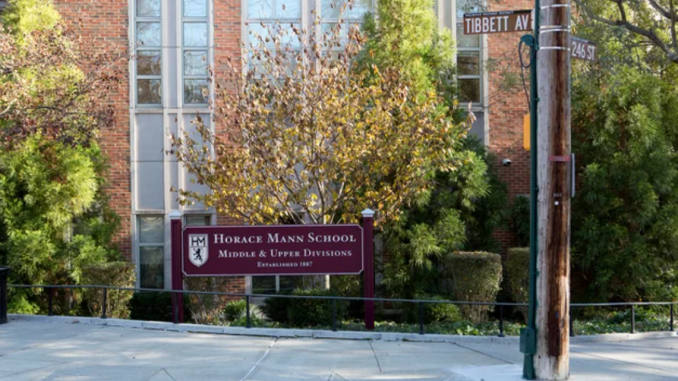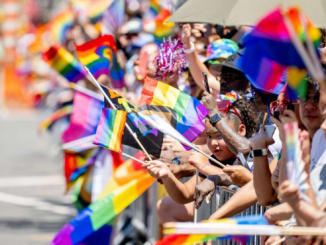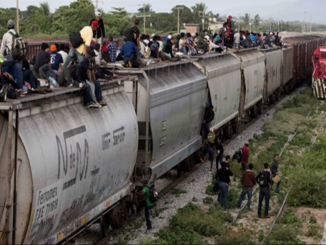
Ryan Finlay is a brave young man. A senior at the elite private Horace Mann School, Finlay last week published a pointed but measured essay describing the aggressive political bias that’s dominated his education on the Bronx campus, where generations of famous and well-connected New Yorkers, from Jack Kerouac to Eliot Spitzer, have matriculated or sent their children.
Faculty “feel obligated to open students’ eyes to the inequality that surrounds them,” Finlay explained, but that takes the form of “continuous pressure in the classroom to embrace visions of wholesale societal reform.”
The message, hammered relentlessly into students’ heads at Horace Mann, is that “the system is broken, unable to be reformed, rotten to the core, and deserving of demolition,” he wrote.
The irony of hyper-privileged New Yorkers paying nearly $60,000 a year for their children to learn they are the undeserving beneficiaries of a broken system need not be dwelled upon here. Finlay’s essay breaks the self-imposed conspiracy of silence that has largely shielded top private schools from criticism from within.
There have been rare exceptions of dissident teachers like Paul Rossi of the Grace School and “Brearley Dad” Andrew Gutmann, who blow the whistle on private-school indoctrination. But few are willing to do so publicly. The largely unquestioned proposition is that private prep schools are the gateway to elite universities and America’s leadership class, an academic arms race famously described in a New York magazine cover story 25 years ago as “Give me Harvard, or give me death.”
Andrew Gutmann demanded parents at Manhattan’s elite Brearley School to fight back against anti-racist curriculum being taught in classrooms.
Robert Miller
This explains how the parent body of these schools can be sloppy with C-suite executives and bold-faced names from media, film and television who grow unaccountably meek and humble in the face of private-school admissions officers and headmasters despite their aggressive, Type-A personalities in every other facet of their lives. Finlay’s very public essay is a tacit rebuke to parents, like those at the exclusive Dalton School, who penned an open letter complaining that “love of learning and teaching is now being abandoned in favor of an ‘anti-racist’ curriculum” but were too timid to sign their names to the seven-page complaint.
Wealthy parents can afford to purchase billboards anonymously demanding elite private schools teach their kids “how to think, not what to think.” But they cannot afford to put at risk their children’s shot at the Ivy League, so they sit and seethe, lest their children be deemed not a good fit and “counseled out.”
The more troubling picture Finlay paints is of a drifting and deeply anti-intellectual institution. It’s a devastating strike at the heart of another story affluent parents comfort themselves with: that the obscene price they pay for elite private school is not about protecting their privilege. Given the chaotic state of public education, there’s simply no other way for children to get a rich and stimulating education. But Finlay makes clear, the object of social-justice-related curricula at Horace Mann “is not for the material to be challenged, but absorbed without question.”
Parents at The Dalton School wrote a scathing letter chastising the institution, but opted not to sign the letter.
Helayne Seidman
The real lesson students are learning is not critical thinking and deep engagement with ideas. It’s self-censorship and risk assessment. “It’s not worth jeopardizing academic success at HM in exchange for political expression,” he concludes.
In the end, exclusive private schools have led themselves into a box canyon from which there can be no honest escape. Like an organism that devours its host, their commitment to equity, inclusivity and “dismantling privilege” requires privileged New Yorkers continue spending north of half a million dollars in tuition for their children to learn that their privileges are unearned and undeserved.
And what reason do elite universities’ admissions offices have to continue to look favorably upon on prep-school graduates when they too are committed to equity? Surely an Ivy League acceptance letter is wasted on someone who was born on third base.
Unless, of course, it’s all a cynical exercise with all involved — parents and faculty alike — believing their professed commitment to social justice insures them against practicing what they preach.
Because let’s be honest. There’s really only one surefire way for elite private schools to demonstrate their commitment to dismantling privilege: close their doors and cease operations.
* Article from: The New York Post
(*) www.WhitePrideHomeSchool.com


